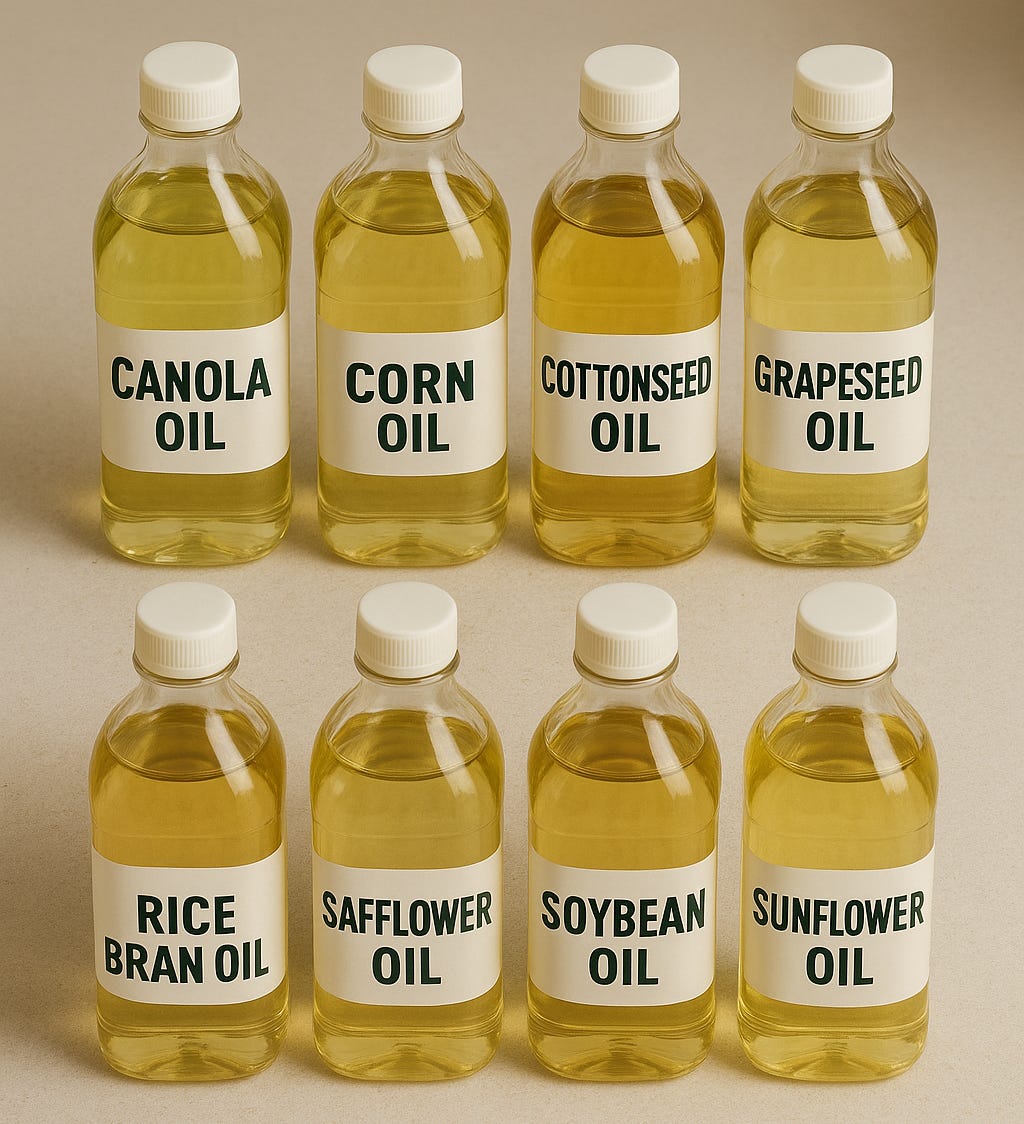Is Seed Oil Really Killing You? What the Science Actually Says
Social media blames seed oils for modern disease. The science doesn’t — let’s cut through the noise and dive into the gray area.
The internet is ablaze with claims that seed oils are toxic, inflammatory, and a root cause of modern disease. Social media feeds are flooded with dire warnings against the "hateful eight" — canola, corn, cottonseed, grapeseed, rice bran, safflower, soybean, and sunflower oils. But are these alarm bells justified, or is it just another wellness myth gone viral? Let's sift through the hype and see what the science, and global health authorities, truly have to say.
Setting the Stage: The Seed Oil Sensation
The fear surrounding seed oils has reached a fever pitch. Advocates of "ancestral" diets or "clean eating" often demonize these common cooking oils, suggesting they are a primary driver of chronic inflammation, heart disease, and other health woes. This narrative often hinges on concerns about their polyunsaturated fatty acid (PUFA) content, particularly omega-6 linoleic acid, and the industrial processing methods used to extract them.
Research Review: PUFA, Oxidation, and Inflammation — What's Legit?
PUFAs are Essential: Omega-6 fatty acids like linoleic acid are essential nutrients. Our bodies cannot produce them. They support cell membranes, hormone production, and immune response.
Oxidation Concerns: PUFAs are more reactive to oxygen due to their double bonds. But commercial seed oils contain natural antioxidants (e.g., vitamin E), and multiple RCTs show no significant rise in oxidative stress markers from consuming these oils.
Inflammation Debate: Despite claims that linoleic acid promotes inflammation via conversion to arachidonic acid, human studies consistently show no increase in inflammatory markers. Some suggest linoleic acid may actually reduce inflammation. Swapping saturated fats with PUFAs lowers cholesterol and CVD risk.
Processing and Hexane: Hexane is used in oil extraction, but trace amounts in final products are well below safety thresholds. Refining processes also remove contaminants and off-flavors.
Global Regulation: Who Restricts It, and Why (or Why Not)?
If seed oils were dangerous, we would expect global restrictions. That hasn’t happened.
Trans Fat, Not PUFAs: Most countries regulate trans fats due to clear cardiovascular harm. PUFAs remain broadly recommended.
Erucic Acid in Canola: Older rapeseed oil had high erucic acid. Modern canola is safe and widely accepted by health agencies.
Guidelines Endorse Seed Oils: The WHO, EFSA, and U.S. dietary guidelines support replacing saturated fats with unsaturated ones, including from seed oils.
What the Skeptics Say: Alternative Concerns and Critiques
Omega-6/3 Imbalance: Critics argue modern diets skew heavily toward omega-6s, potentially promoting inflammation. They cite evolutionary diets and omega-6 conversion to pro-inflammatory eicosanoids. However, the body regulates this conversion, and the impact on health markers is negligible in trials.
Oxidation from Cooking: Skeptics raise concerns about oxidation during high-heat cooking. Oxidized byproducts from repeatedly heated oils can be harmful. While valid in deep frying contexts, typical home use poses minimal risk.
Traditional Fats Displacement: Some argue that the shift from animal fats to seed oils has removed nutrient-dense foods from the diet. While animal fats do contain fat-soluble vitamins, replacing saturated fats with PUFAs has consistently shown health benefits in trials.
Industry Influence and Science Skepticism: Some critiques focus on funding bias and historical missteps in nutrition science. Notable skeptics like Nina Teicholz argue that key studies were misinterpreted or selectively published.
Key Evidence: Studies, Consensus, and Funding Sources
Meta-Analyses: Broad reviews find PUFAs reduce LDL and CVD risk. These are often funded by NIH, EU grants, or academic bodies. Example: Petersen et al. (2024), AJCN, funded by university grants.
RCTs: Studies like the Oslo Diet-Heart Study and DART trial show cardiovascular benefits from PUFA substitution. Some, like the Minnesota Coronary Experiment, found lower cholesterol but no mortality change—a favorite of skeptics, but seen as inconclusive due to design flaws. These included a lack of dietary compliance, poor data reporting, and high dropout rates that limit interpretation.
Cohort Studies: Long-term research (e.g., Nurses' Health Study) shows lower heart disease risk with higher PUFA intake. Primarily funded by NIH.
Skeptic-Used Evidence: Sydney Diet Heart Study and animal trials on oxidized oils. Critics highlight these to question the safety of linoleic acid, but the broader body of evidence finds no consistent harm.
Despite these dissenting studies and alternative hypotheses, the totality of high-quality evidence across decades, geographies, and funding sources continues to support the safety and benefits of PUFAs — particularly when they replace saturated fats in the diet.
The Bottom Line: What You Should Focus On Instead
The scientific consensus is clear: Seed oils are not killing you.
What's Hype: Claims that seed oils inherently cause inflammation or toxicity are not backed by strong human data.
What's Real: Seed oils provide essential fats and vitamin E, and can reduce cardiovascular risk when replacing saturated fats.
What to Do:
Prioritize whole, minimally processed foods.
Avoid ultra-processed products, many of which contain seed oils.
Use stable fats like EVOO for dressing or animal fats for high-heat cooking.
Don’t fear seed oils — but don’t seek them out either.
A Personal Note: Personally, I choose not to buy seed oils. In my kitchen, I use extra virgin olive oil for dressings and toppings, avocado oil and butter for low-heat cooking, and ghee or beef tallow for high-heat applications. You can use seed oils — it's a preference. If you do, try to choose oils packaged in glass or metal instead of plastic to avoid microplastics, and opt for higher-quality brands when possible.
In other words; balance, not fear, should guide your fat choices.





